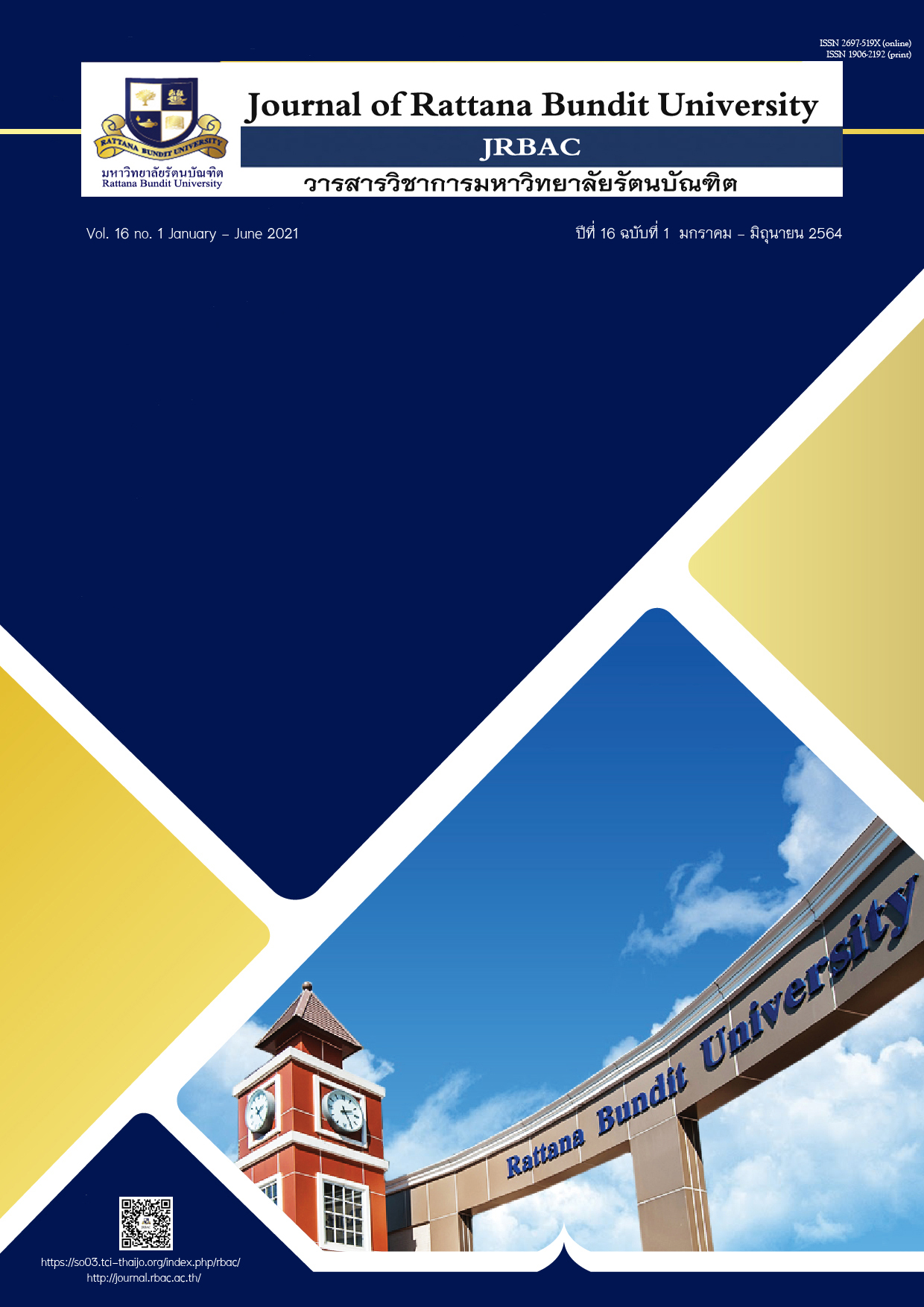Factors affecting learning results on mobile learning in Thailand A meta-analysis
Main Article Content
Abstract
The purposes of this research were: 1) to analyze the basic information of research concerning mobile learning, 2) to analyze effect sizes from factors affecting students learning results in mobile learning, and 3) to synthesize findings appropriate for learning results in mobile learning. Based on the meta-analysis approach and the basic mobile learning frameworks, the study analyzed 66 experimental research published during 2009-2019 by selecting a specific sample group of 66 volumes. The research results illustrate three significant aspects. Firstly, the analyzed research was published in 2015 and mainly from Silpakorn University and Master's degree level. Secondly, the overall mean of the effect size of the research affecting students' learning results in mobile learning is relatively high. Finally, the synthesis factors in developing learning results of mobile learning from the meta-analysis approach and basic frameworks such as pedagogy indicate that collaborative learning is the most prevalent, influencing learning results at a very high level. Concerning the factor of contents, the career and technology-based contents, which influence the development of learning results at a very high level, were mainly used. Regarding the factor of technology for learning management with mobile learning technology, HTML5 was chosen the most. It influences the development of learning results at the medium level. Concerning the courseware technology, the results suggest that the use of VDO was the most popular, which influences the development of learning results at a high level
Article Details
References
Almarabeh, Hilal, Amer, Ehab, & Sulieman, Amjad. (2015). The effectiveness of multimedia learning tools in education. International Journal of Advanced Research in Computer Science and Software Engineering, 5, 761.
Bunlikhitsiri, B. (2005). Effects of a web-based game-based learning interaction model on educational achievement of computer networked training and control center personnel Naresuan University (Master of thesis). Chulalongkorn University, Bangkok. (in Thai)
บุญชู บุญลิขิตศิริ. (2548). ผลของรูปแบบการปฏิสัมพันธ์ทางการเรียนในการฝึกอบรมโดยใช้เกมเป็นฐานบนเว็บที่มีต่อผลสัมฤทธิ์ทางการเรียนของบุคลากรศูนย์ฝึกอบรมและควบคุมระบบเครือข่ายคอมพิวเตอร์ มหาวิทยาลัยนเรศวร (ปริญญามหาบัณฑิต). จุฬาลงกรณ์มหาวิทยาลัย, กรุงเทพฯ.
Bunsung, J. (2002). Synthesis of research methods in the master of education thesis, Faculty of Education Chiang Mai University (Master of thesis). Chiang Mai University, Chiang Mai. (in Thai)
จิรพรรณ บุญสูง. (2545). การสังเคราะห์วิธีวิทยาการวิจัยในวิทยานิพนธ์ศึกษาศาสตร์มหาบัณฑิตคณะศึกษาศาสตร์ มหาบัณฑิต คณะศึกษาศาสตร์ มหาวิทยาลัยเชียงใหม่ (ปริญญามหาบัณฑิต). มหาวิทยาลัยเชียงใหม่, เชียงใหม่.
Chamonman, U. (1988). Research synthesis: A quantitative approach focusing on a meta-analysis method. Bangkok: Funny Publishing. (in Thai)
อุทุมพร จามรมาน. (2531). การสังเคราะห์งานวิจัย: เชิงปริมาณ (Research synthesis: A quantitative approach) เน้นวิธีวิเคราะห์เมตต้า (A meta-analysis) กรุงเทพฯ: ฟันนี่พับบลิชชิ่ง.
Georgiev, T., Georgieva, E., & Smrikarov, A. (2004). M-learning: A new stage of e-learning. CompSysTech '04: Proceedings of the 5th international conference on computer systems and technologies, 1–5.
Glass, G. V., Smith, M. L., & McGaw, B. (1981). Meta-analysis in social research. CA: SAGE.
Khammanee, T. (2007). Pedagogy: Knowledge for effective learning process (Vol. 9). Bangkok: Chulalongkorn University. (in Thai)
ทิศนา แขมมณี. (2550). ศาสตร์การสอน: องค์ความรู้เพื่อการจัดกระบวนการเรียนรู้ที่มีประสิทธิภาพ (Vol. 9). กรุงเทพฯ: สำนักพิมพ์แห่งจุฬาลงกรณ์มหาวิทยาลัย.
Na Songkhla, J. (2007). Doctrine reusable learning object. Bangkok: Chulalongkorn University. (in Thai)
ใจทิพย์ ณ สงขลา. (2550). เอกสารคำสอน Reusable เลิร์นนิงออปเจ็กต์. จุฬาลงกรณ์มหาวิทยาลัย, กรุงเทพฯ
NuchPho, N., & ChaiRuen, O. (2014). Door opener with android phone. Chiang Mai: Rajamangala University of Lanna. (in Thai)
นนท์ปวิธ นุชโพธิ์และอรรนพ ไชยเรือน. (2557). เครื่องเปิดประตูด้วยโทรศัพท์ระบบแอนดรอย. เชียงใหม่: มหาวิทยาลัยราชมงคลล้านนา.
Pahe, S. (2013). Flipped classroom the way: A new classroom in the 21st century. Retrieved from http://www.mbuisc.ac.th/phd/academic/flipped%20classroom2.pdf (in Thai)
สุรศักดิ์ ปาเฮ. (2556). ห้องเรียนกลับทาง: ห้องเรียนมิติใหม่ในศตวรรษที่ 21. สืบค้นจาก http://www.mbuisc.ac.th/phd/academic/flipped%20classroom2.pdf
Parsons, D., Ryu, H., & Cranshaw, M. (2007). A design requirements framework for mobile learning environments. Journal of Computers (Finland), 2(4), 1-8. https://doi.org/10.4304/jcp.2.4.1-8
Prommanee, W. (2011). Factors affecting learning outcomes in web-based instructional management: A meta-analysis (Doctoral thesis). Chulalongkorn University, Bangkok. (in Thai)
วรากร พรหมมณี. (2554). ปัจจัยที่ส่งผลต่อผลการเรียนรู้ในการจัดการเรียนการสอนบนเว็บ: การวิเคราะห์อภิมาน (ปริญญาดุษฎีบัณฑิต). จุฬาลงกรณ์มหาวิทยาลัย, กรุงเทพฯ.
Saisuwan, K. (2012). Developing a learning management model by integrating mobile learning with a common solution to foster curiosity for undergraduates. Chulalongkorn University, Bangkok. (in Thai)
กชกร สายสุวรรณ. (2555). การพัฒนารูปแบบการจัดการเรียนรู้โดยบูรณาการโมบายเลิร์นนิงด้วยวิธีการแก้ปัญหาร่วมกันเพื่อส่งเสริมความใฝ่รู้สำหรับนักศึกษาปริญญาตรี. จุฬาลงกรณ์มหาวิทยาลัย, กรุงเทพฯ.
Schofield, C. P., West, T., & Taylor, E. (2011). Going mobile in executive education: How mobile technologies are changing the executive learning landscape. Hertfordshire: Ashridge and UNICON.
Sivetakul, W. (2015). Development of a 5E learning model through mobile learning technology strengthen the rational competence of early elementary school students (Doctor's thesis). Chulalongkorn University, Bangkok. (in Thai)
วีรชา ศิวเวทกุล. (2558). การพัฒนารูปแบบการเรียนรู้ 5E ผ่านเทคโนโลยีการเรียนรู้เคลื่อนที่เพื่อเสริมสร้างความสามารถด้านเหตุผลของนักเรียนประถมศึกษาตอนต้น (วิทยานิพนธ์ดุษฎีบัณฑิต). จุฬาลงกรณ์มหาวิทยาลัย, กรุงเทพฯ.
Suanpreng, p. (2013). Innovation of computer use. Portable for self-learning of undergraduate students. Suan Dusit Rajabhat University, Bangkok. (in Thai)
พรรณี สวนเพลง. (2013). นวัตกรรมการใช้เครื่องคอมพิวเตอร์แบบพกพาเพื่อการเรียนรู้ด้วยตนเองของนักศึกษาระดับปริญญาตรี (ปริญญามหาบัณฑิต). มหาวิทยาลัยราชภัฏสวนดุสิต, กรุงเทพฯ.
Vate-U-Lan, P. (2008). M-learning wireless network learning. Retrieved from http://thaimlearning.blogspot.com (in Thai)
พูลศรี เวศย์อุฬาร. (2551). เอ็มเลิร์นนิ่งการเรียนทางเครือข่ายไร้สาย Mobile learning (mLearning). สืบค้นจาก http://thaimlearning.blogspot.com
Wiratchai, N. (2007). Advanced statistical analysis appropriate for research in psycho-behavioral sciences. Chulalongkorn University, Bangkok. (in Thai)
นงลักษณ์ วิรัชชัย. (2550). การวิเคราะห์ทางสถิติขั้นสูงที่เหมาะสมกับงานวิจัยทางจิตพฤติกรรมศาสตร์. กรุงเทพฯ: จุฬาลงกรณ์มหาวิทยาลัย.
Wiratchai, N. and Wongwanich, S. (1998). Analysis of the university rankings of Asian. Bangkok: Faculty of Education, Chulalongkorn University, Bangkok. (in Thai)
นงลักษณ์ วิรัชชัย และสุวิมล ว่องวาณิช. (2541). การวิเคราะห์การจัดอันดับมหาวิทยาลัยของประเทศในเอเชีย. กรุงเทพฯ: คณะครุศาสตร์ จุฬาลงกรณ์มหาวิทยาลัย.
Wiratchai, N. and Wongwanich, S. (2015). Synthesis of educational research with meta-analysis and content analysis. Journal of Research Methods, 12(2), 1-14. (in Thai)
นงลักษณ์ วิรัชชัย และสุวิมล ว่องวาณิช. (2558). การสังเคราะห์งานวิจัยทางการศึกษาด้วยการวิเคราะห์อภิมานและการวิเคราะห์เนื้อหา. วารสารวิธีวิทยาการวิจัย, 12(2), 1-14.


